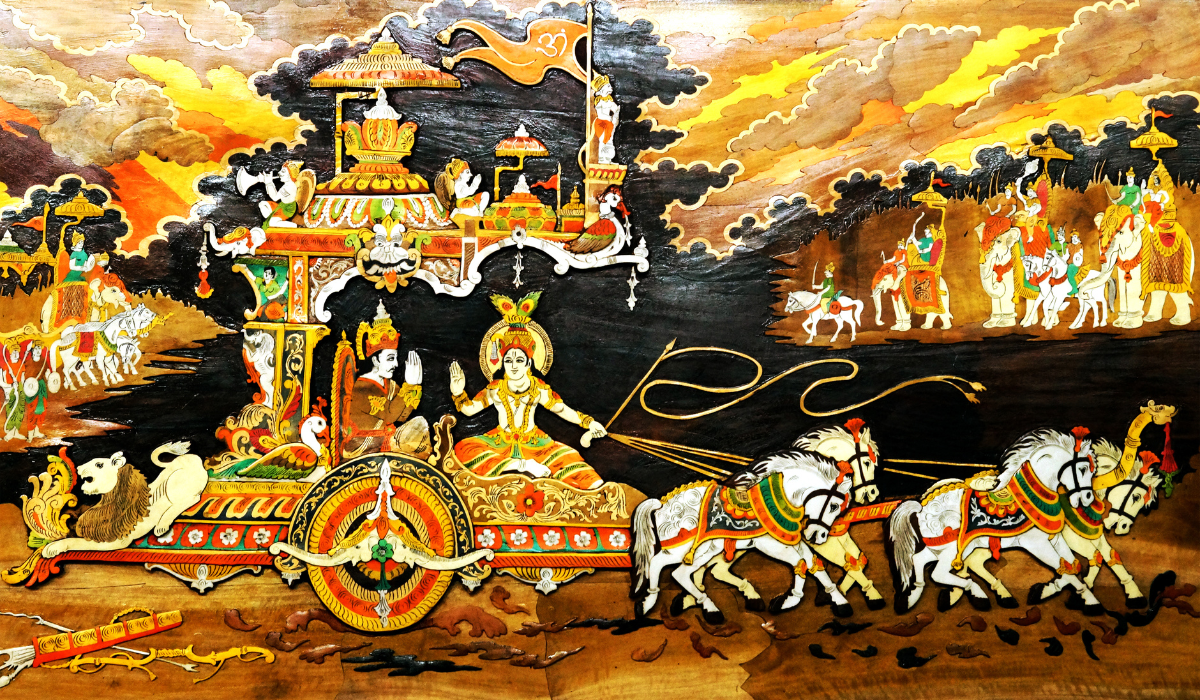The adage “For every problem, there is a solution,” is a widely acknowledged truth. It underscores the importance of recognizing and leveraging solutions when faced with challenges. In the Shrimad Bhagavad Gita, Lord Shri Krishna imparts profound wisdom that sheds light on the purpose of human existence and offers guidance on navigating life’s complexities. Presented as a dialogue between the warrior Arjun and his charioteer, Lord Krishna, the Bhagavad Gita delves into various themes such as Dharma (duty/righteousness), Karma (action), the distinction between spiritual and material realms, the path of devotion (Bhakti yoga), understanding the body and the soul, the concepts of Aatma (individual self) and Parmatma (supreme self), and the cultivation of virtuous living. Through these teachings, individuals learn how to confront and overcome the trials and tribulations of life.
Here are five important shlokas from the Shrimad Bhagavad Gita that may be used to aid people with day-to-day challenges.
Five Bhagavad Gita Shlokas to Help With Life’s Problems
1. Shloka 2.14 (Chapter 2, Verse 14)
मात्रास्पर्शास्तु कौन्तेय शीतोष्णसुखदुःखदाः ।
आगमापायिनोऽनित्यास्तांस्तितिक्षस्व भारत ।।
mātrā-sparśhās tu kaunteya śhītoṣhṇa-sukha-duḥkha-dāḥ
āgamāpāyino ’nityās tans-titikṣhasva bhārata
In Bhagavad Gita verse 2.14, it’s elucidated that life’s pleasures and pains are fleeting, akin to the changing seasons of winter and summer. Just as seasons transition, so do moments of happiness and sorrow. Hence, cultivating equanimity is crucial, allowing us to embrace both without disturbing our inner peace. Developing resilience against life’s fluctuations becomes imperative, enabling us to navigate its ebb and flow with steadiness.
2. Shloka 3.19 (Chapter 3, Verse 19)
तस्मादसक्तः सततं कार्यं कर्म समाचर।
असक्तो ह्याचरन् कर्म परं आप्नोति पूरुषः।।
tasmād asaktaḥ satataṁ kāryaṁ karma samāchara
asakto hyācharan karma param āpnoti pūruṣhaḥ
Bhagavad Gita verse 3.19 underscores the importance of maintaining a sense of detachment while fulfilling our duties. It stresses focusing on the task at hand with sincerity and dedication, rather than fixating on the results. By adopting this approach, we can attain a state of serenity and inner harmony, ultimately leading to the goal of spiritual liberation.
3. Shloka 3.21 (Chapter 3, Verse 21)
यद्यदाचरति श्रेष्ठस्तत्तदेवेतरो जनः।
स यत्प्रमाणं कुरुते लोकस्तदनुवर्तते।।
yad yad ācharati śhreṣhṭhas tat tad evetaro janaḥ
sa yat pramāṇaṁ kurute lokas tad anuvartate
This verse from the Bhagavad Gita emphasizes the profound influence that influential or revered figures have on society. It suggests that people tend to emulate the actions and behaviors of those they perceive as significant or heroic. Therefore, individuals in positions of leadership or influence bear a great responsibility to set a virtuous example. By embodying moral and ethical conduct, they inspire others to follow suit, contributing to the betterment of society as a whole.
4. Shloka 3.35 (Chapter 3, Verse 35)
श्रेयान् स्वधर्मो विगुणः परधर्मात्स्वनुष्ठितात्।
स्वधर्मे निधनं श्रेयः परधर्मो भयावहः॥
śhreyān swa-dharmo viguṇaḥ para-dharmāt sv-anuṣhṭhitāt
swa-dharme nidhanaṁ śhreyaḥ para-dharmo bhayāvahaḥ
Engaging in one’s own duties brings a sense of contentment and purpose, while shouldering the responsibilities of others often leads to apprehension and disquiet. Individuals must focus on fulfilling their own dharma, which encompasses their inherent duties and life’s purpose, to the best of their capabilities. By dedicating themselves wholeheartedly to their own path, individuals not only find fulfillment but also contribute positively to the collective harmony of society.
5. Shloka 18.58 (Chapter 18, Verse 58)
मच्चित्तः सर्वदुर्गाणि मत्प्रसादात्तरिष्यसि।
अथ चेत्त्वमहङ्कारान्न श्रोष्यसि विनङ्क्ष्यसि॥
mac-cittaḥ sarvadurgāṇi matprasādāttariṣyasi
atha cettvamahaṅkārānna śroṣyasi vinaṅkṣyasi
This verse underscores the profound significance of surrendering to the divine and seeking the grace of God as a source of refuge from life’s trials and tribulations. It encourages individuals to humbly submit their egos and approach God with reverence, recognizing His omnipotence and benevolence. Failure to cultivate this surrender may hinder one’s spiritual journey and impede personal growth and development. Therefore, embracing humility and seeking divine guidance becomes paramount for navigating life’s challenges and fostering spiritual evolution.
Also Read: 4 Ways How Successful People Think Differently Than You








